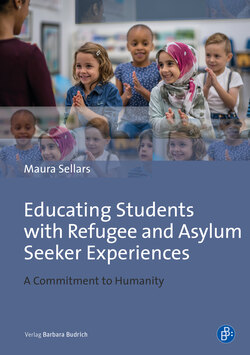Читать книгу Educating Students with Refugee and Asylum Seeker Experiences - Maura Sellars - Страница 11
На сайте Литреса книга снята с продажи.
The Purpose of Education in a Neoliberal Paradigm
ОглавлениеIn congruence with educational policies which are developed according to economic principles, the purpose of education is reconceptualised to reflect these values and processes. The neoliberal ideology has a very distinct understanding of the purpose of schooling. Students are regarded as ‘human capital’ and are educated to have the skills and attitudes of a productive workforce (Gary, 2016). This is in contrast to previous sociological theories of schools as institutions for the reproduction of society, for example Bourdieu’s understanding of purpose of education (Bourdieu, 1986b, 1990; Bourdieu et al., 1994), and the use of institutional regulation, monitoring and conditioning to produce a subservient, passive society as in Foucault’ theory of the Panopticon (Foucault, 1977, 1979). This is not to dismiss these theories as irrelevant to the neoliberal purpose of education, as has been indicated previously, the notion of capital is critical to the neoliberal educational endeavour, and Foucault’s understanding of schools as institutions under regular surveillance and monitoring remain major themes in education dominated by neoliberal economic policies. Currently, there is considerable discussion about Bourdieu’s notions of capital, most specifically the understanding of social capital (see, for example, Putnam, 2002; Putnam & Goss, 2002) and Foucault’s Panopticism (Ball, 2012, 2013; Hope, 2013) and their relevance to the contemporary purpose of education. Both philosophies are discussed later in more detail as they are important in the interpretation of the neoliberal purpose of education and to the lived realities of students with refugee experiences in school systems of countries where this is the dominant political paradigm.
Productivity is foundational to the neoliberal notion of education. People have become increasingly productive through time as the result of the changing of society, increased technological advances, more powerful energy sources and more efficient production processes (Zhao, 2012). However, increased productivity is not a world- wide phenomenon. In the context of first world countries, it has produced better living conditions, better health options and longer working lives, and decreased opportunities for employment in many traditional occupations. Zhao (2012:66), discusses ‘creating jobs, not finding jobs’ as a perspective from which to view the future. This is entirely congruent with the neoliberal agenda of expanding existing markets and creating new ones, however, not entirely realistic given the limited curriculum, prescriptive pedagogies and ever increasing permeation of competition in neoliberal education systems which dominate first world countries (Ross, 2017) . A positive view of this paradigm is that education was created for the role that it now plays in preparing individuals by training them in languages and skills of society and then sorting them out into appropriate roles in that context. A more critical view is that the power that is exercised in this sorting process is dominated by those groups who are privileged in society, and that education is used as a tool to reinforce and reproduce the advantages of these groups only, to the exclusion of those who are not members (Connell, 2013a).
An equally important, but less discussed feature of neoliberal education philosophy in both its vision and purpose of education is the way in which it reduces the wholeness and complexity of human life to simply that of workers (Gary, 2016). Human beings are distinguished from other life forms by their capacities for reflection, exploration and investigation and other meaningful forms of leisure that [6] are not just the state of not working, but that are rich non-work experiences that fulfil a deeply held human need and provide opportunities to develop another way of viewing the world. Gary (2016) particularly highlights that education in the neoliberal ideology not only lends itself to individuals increasingly identifying themselves in terms of work, but dehumanizes individuals. He argues that not only does it collapse what it is to be human into producers and consumers, but encourages people to live at a superficial level, that which is not to do with reason and intellectual activity, but is ‘operating below the cognitive- reasoning register’; operating at the level of consumer desire. The most critical feature that Gary (2106) brings to the discussion about the neoliberal educational paradigm is that of quality of schooling. He states, ‘the cerebral emphasis of modern schooling…is poorly equipped to guide us into an alternative way of being’. To engage with ‘an alternative way of being’, he recommends radical pedagogy, including a change of habitus (Bourdieu, 1986a). This assessment of the lack of scholarship in neoliberal educational frameworks is echoed by Ross (2017) who states ‘when education is forced into the marketplace, the marketplace of ideas shuts down’. It is into this educational paradigm that students with refugee experiences are placed when being accepted into the so called ‘developed’ countries which embrace neoliberal ideology in any of its diverse manifestations.
